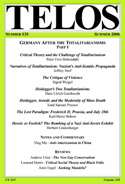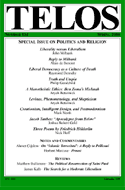By Russell A. Berman · Wednesday, June 7, 2006 Telos 135: Germany after the Totalitarianisms, Part I is available for purchase in our store.
 With the collapse of the Soviet Union and the end of the Cold War, a widespread rethinking of political history and social theory commenced. Questions long frozen in the glacial stand-off between East and West began to thaw out, and the ideological mythologies of the twentieth century were subjected to new scrutiny. Why had the century of modernity been so centrally catastrophic? What was the nature of the worst offenders, the totalitarian regimes—especially in Germany, Italy, and Russia—that had generated so much violence? How could intellectuals and public opinion alike have facilely regarded Nazi Germany and fascist Italy as nearly identical formations (when they displayed so many differences)? And how could Stalinist Russia have been hailed as a positive alternative to Nazi Germany (when they displayed so many similarities)? With the disappearance of the Soviet Union, these interrogations could be pursued without the agenda, baggage, and defensiveness of the previous historical era. The question of the totalitarian state could finally be posed with the advantage of historical distance.. With the collapse of the Soviet Union and the end of the Cold War, a widespread rethinking of political history and social theory commenced. Questions long frozen in the glacial stand-off between East and West began to thaw out, and the ideological mythologies of the twentieth century were subjected to new scrutiny. Why had the century of modernity been so centrally catastrophic? What was the nature of the worst offenders, the totalitarian regimes—especially in Germany, Italy, and Russia—that had generated so much violence? How could intellectuals and public opinion alike have facilely regarded Nazi Germany and fascist Italy as nearly identical formations (when they displayed so many differences)? And how could Stalinist Russia have been hailed as a positive alternative to Nazi Germany (when they displayed so many similarities)? With the disappearance of the Soviet Union, these interrogations could be pursued without the agenda, baggage, and defensiveness of the previous historical era. The question of the totalitarian state could finally be posed with the advantage of historical distance..
Continue reading →
By Russell A. Berman · Friday, March 10, 2006 Telos 134: Politics and Religion is available for purchase in our store
 “Au secours, Voltaire! Ils sont fous.“ (“Save us Voltaire, they are crazy.”) With this cry for help, the French newspaper France Soir appealed to a national hero, the notoriously anti-religious philosopher of the Enlightenment, in the face of burgeoning Muslim protests against its reproduction of the Danish caricatures of Mohammed. As of this writing, European embassies in Damascus are in flames, and angry protestors have filled the streets from Jakarta to Jutland. The consequences are, as the Danish Prime Minister has put it, “unforeseeable,” at least as far as the political dimension goes. Suddenly it is Western Europe and not the U.S. that bears the brunt of Muslim anger. The contrast is telling, though hardly a reason to gloat. On the eve of the Iraq War, opponents warned that the “Arab street” would be up in arms if the U.S. were to invade. Nothing of the sort ensued; with few exceptions, demonstrations in the Muslim world in response to Operation Iraqi Freedom were few and far between. How striking the difference, then, is the scope of public outrage to the cartoons in the European press. When all is said and done, caricaturing the Prophet is worse than toppling Saddam. Reams of public opinion polling about anti-Americanism in the Arab world suddenly seem irrelevant in the face of this unpredicted explosion of anti-European sentiment. (The long-standing pro-Palestinian tilt of Denmark and Norway has not won them much sympathy, not even in Gaza.) “Au secours, Voltaire! Ils sont fous.“ (“Save us Voltaire, they are crazy.”) With this cry for help, the French newspaper France Soir appealed to a national hero, the notoriously anti-religious philosopher of the Enlightenment, in the face of burgeoning Muslim protests against its reproduction of the Danish caricatures of Mohammed. As of this writing, European embassies in Damascus are in flames, and angry protestors have filled the streets from Jakarta to Jutland. The consequences are, as the Danish Prime Minister has put it, “unforeseeable,” at least as far as the political dimension goes. Suddenly it is Western Europe and not the U.S. that bears the brunt of Muslim anger. The contrast is telling, though hardly a reason to gloat. On the eve of the Iraq War, opponents warned that the “Arab street” would be up in arms if the U.S. were to invade. Nothing of the sort ensued; with few exceptions, demonstrations in the Muslim world in response to Operation Iraqi Freedom were few and far between. How striking the difference, then, is the scope of public outrage to the cartoons in the European press. When all is said and done, caricaturing the Prophet is worse than toppling Saddam. Reams of public opinion polling about anti-Americanism in the Arab world suddenly seem irrelevant in the face of this unpredicted explosion of anti-European sentiment. (The long-standing pro-Palestinian tilt of Denmark and Norway has not won them much sympathy, not even in Gaza.)
Continue reading →
|
|
 With the collapse of the Soviet Union and the end of the Cold War, a widespread rethinking of political history and social theory commenced. Questions long frozen in the glacial stand-off between East and West began to thaw out, and the ideological mythologies of the twentieth century were subjected to new scrutiny. Why had the century of modernity been so centrally catastrophic? What was the nature of the worst offenders, the totalitarian regimes—especially in Germany, Italy, and Russia—that had generated so much violence? How could intellectuals and public opinion alike have facilely regarded Nazi Germany and fascist Italy as nearly identical formations (when they displayed so many differences)? And how could Stalinist Russia have been hailed as a positive alternative to Nazi Germany (when they displayed so many similarities)? With the disappearance of the Soviet Union, these interrogations could be pursued without the agenda, baggage, and defensiveness of the previous historical era. The question of the totalitarian state could finally be posed with the advantage of historical distance..
With the collapse of the Soviet Union and the end of the Cold War, a widespread rethinking of political history and social theory commenced. Questions long frozen in the glacial stand-off between East and West began to thaw out, and the ideological mythologies of the twentieth century were subjected to new scrutiny. Why had the century of modernity been so centrally catastrophic? What was the nature of the worst offenders, the totalitarian regimes—especially in Germany, Italy, and Russia—that had generated so much violence? How could intellectuals and public opinion alike have facilely regarded Nazi Germany and fascist Italy as nearly identical formations (when they displayed so many differences)? And how could Stalinist Russia have been hailed as a positive alternative to Nazi Germany (when they displayed so many similarities)? With the disappearance of the Soviet Union, these interrogations could be pursued without the agenda, baggage, and defensiveness of the previous historical era. The question of the totalitarian state could finally be posed with the advantage of historical distance.. “Au secours, Voltaire! Ils sont fous.“ (“Save us Voltaire, they are crazy.”) With this cry for help, the French newspaper France Soir appealed to a national hero, the notoriously anti-religious philosopher of the Enlightenment, in the face of burgeoning Muslim protests against its reproduction of the Danish caricatures of Mohammed. As of this writing, European embassies in Damascus are in flames, and angry protestors have filled the streets from Jakarta to Jutland. The consequences are, as the Danish Prime Minister has put it, “unforeseeable,” at least as far as the political dimension goes. Suddenly it is Western Europe and not the U.S. that bears the brunt of Muslim anger. The contrast is telling, though hardly a reason to gloat. On the eve of the Iraq War, opponents warned that the “Arab street” would be up in arms if the U.S. were to invade. Nothing of the sort ensued; with few exceptions, demonstrations in the Muslim world in response to Operation Iraqi Freedom were few and far between. How striking the difference, then, is the scope of public outrage to the cartoons in the European press. When all is said and done, caricaturing the Prophet is worse than toppling Saddam. Reams of public opinion polling about anti-Americanism in the Arab world suddenly seem irrelevant in the face of this unpredicted explosion of anti-European sentiment. (The long-standing pro-Palestinian tilt of Denmark and Norway has not won them much sympathy, not even in Gaza.)
“Au secours, Voltaire! Ils sont fous.“ (“Save us Voltaire, they are crazy.”) With this cry for help, the French newspaper France Soir appealed to a national hero, the notoriously anti-religious philosopher of the Enlightenment, in the face of burgeoning Muslim protests against its reproduction of the Danish caricatures of Mohammed. As of this writing, European embassies in Damascus are in flames, and angry protestors have filled the streets from Jakarta to Jutland. The consequences are, as the Danish Prime Minister has put it, “unforeseeable,” at least as far as the political dimension goes. Suddenly it is Western Europe and not the U.S. that bears the brunt of Muslim anger. The contrast is telling, though hardly a reason to gloat. On the eve of the Iraq War, opponents warned that the “Arab street” would be up in arms if the U.S. were to invade. Nothing of the sort ensued; with few exceptions, demonstrations in the Muslim world in response to Operation Iraqi Freedom were few and far between. How striking the difference, then, is the scope of public outrage to the cartoons in the European press. When all is said and done, caricaturing the Prophet is worse than toppling Saddam. Reams of public opinion polling about anti-Americanism in the Arab world suddenly seem irrelevant in the face of this unpredicted explosion of anti-European sentiment. (The long-standing pro-Palestinian tilt of Denmark and Norway has not won them much sympathy, not even in Gaza.)

